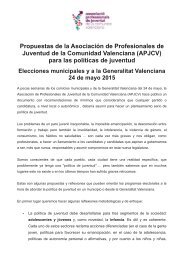c39dc
c39dc
c39dc
Create successful ePaper yourself
Turn your PDF publications into a flip-book with our unique Google optimized e-Paper software.
Integrity 3.58 3.69 3.54 3.67 3.38<br />
Intercultural<br />
skills<br />
4.12 4.02 3.79 4.02 3.46<br />
IT skills 2.50 2.51 2.08 2.52 2.04<br />
Leadership 3.92 3.79 3.58 3.29 3.17<br />
Literacy<br />
and/or<br />
numeracy<br />
Organisational<br />
skills<br />
Problem<br />
solving skills<br />
Selfconfidence<br />
2.53 2.60 2.40 2.89 2.57<br />
3.91 3.88 3.62 3.52 3.60<br />
3.85 3.79 3.63 3.64 3.57<br />
4.03 4.02 3.75 3.76 3.62<br />
Team-working<br />
4.22 4.18 4.14 3.98 4.26<br />
skills<br />
Source: Bath/ICF-GHK survey * The vast majority of survey<br />
respondents (around 85%) were over 20 years old, meaning they<br />
were at the age when they are either working or in higher education.<br />
16% of respondents were between 16 and 20 years old, meaning still<br />
possibly enrolled in general education.<br />
Out of the top 6 skills and competences most often mentioned as<br />
demanded by employers reported in section 4.1 five are also amongst<br />
those developed to a greater extent through involvement in youth<br />
organisations, reflecting a very strong match between both aspects.<br />
Thus, communication skills, organisational/planning skills, decisionmaking<br />
skills, team-working skills, confidence/autonomy are also<br />
amongst those skills developed to a greater extent through<br />
involvement in youth organisations, and are very often demanded by<br />
employers. This pattern is only less neat for numeracy, which was<br />
also often mentioned as being demanded by employers, but is<br />
developed to a less significant extent through youth work than the<br />
other five skills and competences previously mentioned.<br />
During the stakeholder workshop, employers and other<br />
stakeholders also supported, the view that young people develop a<br />
wide range of skills and competences through their involvement in<br />
youth organisations, including the following:<br />
• Team working;<br />
• Organisation of work and time;<br />
• Taking responsibility;<br />
• Adaptability;<br />
• Autonomy;<br />
• Resilience and perform under stress;<br />
46




